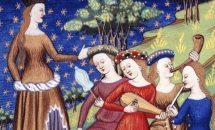From the 16th to the 18th centuries, the cloistered convent was one of the few places in which women could professionally practice music in a morally acceptable context, given that they were not allowed to sing in cathedral chapels (only boys and men were permitted this), and that their performances in theatres were generally considered immoral. The rich musical activity (in terms of both composition and performing) of women in convents, an area virtually ignored by traditional historiography, has aroused enormous interest in recent years. Were nuns considered to be angelic beings who only sang to honour divine worship, or were they sirens who attracted a large number of people from outside the convent with their musical performances? Was music used by nuns as a weapon of resistance to the male authorities that attempted to control them, as part of recent historiography has suggested? In this lecture, the speaker will be exploring these points by examining examples of Spanish, Italian and Hispano-American convents.
Cycle: Women and Music
Organized by: Residence for Researches
